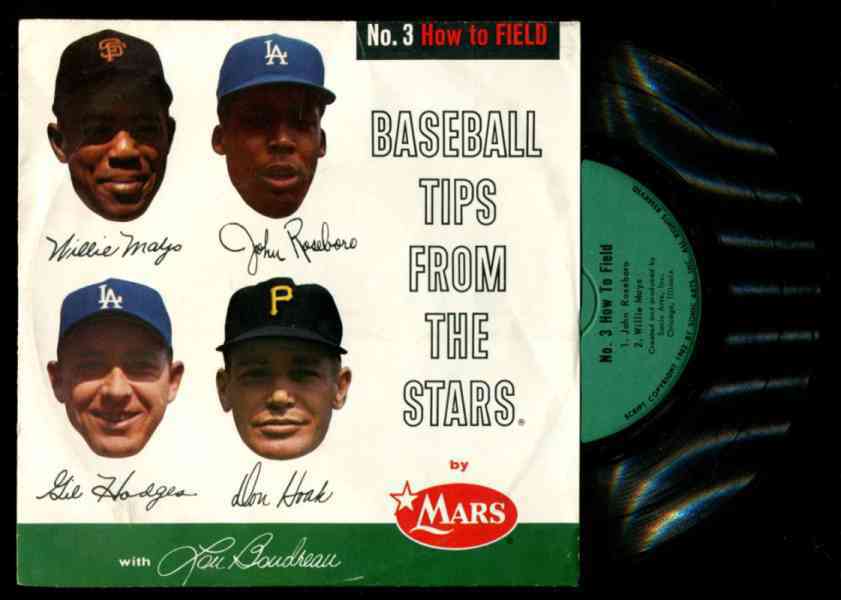Willie, Mickey & 'The Duke' (Talkin' Baseball) - 45 rpm record
A GREAT ITEM and a great song !!! Willie Mays, Mickey Mantle & Duke Snider !!! Record is like new and jacket is EX. (1981).

Please wander around the website for more info, prices, values & images
on vintage baseball, football, basketball, hockey, sport and non-sports cards.
1972 O-Pee-Chee BaseballAlso referred to as OPC or Topps Canada, most vintage OPC sets were near replicas of the Topps cards from that year. Exactly same in design they usually only differed with the addition of French to the backs and some fronts. Cards differed from their Topps versions mostly due to "Made in Canada",
French/English and different colored backs.
the sets, such as "Boyhood Photos" and "In Action" cards.
Card #465 Gil Hodges is the only card differing significantly from
its corresponding Topps card, which notes his April of 1972 death.
First Time features were "Boyhood Photos" and "In Action" cards.
The O-Pee-Chee cards can be distinguished from Topps cards by
This was also the first year the cards denoted O.P.C. in the
copyright line rather than T.C.G.
There is one card in the set which is notably different from the
corresponding Topps, Gil Hodges #465, which notes his death in April
on the OPC card.
Cards differed from their Topps versions mostly due to "Made in Canada",
French/English and different colored backs.
the sets, such as "Boyhood Photos" and "In Action" cards.
Card #465 Gil Hodges is the only card differing significantly from
its corresponding Topps card, which notes his April of 1972 death.
First Time features were "Boyhood Photos" and "In Action" cards.
The O-Pee-Chee cards can be distinguished from Topps cards by
This was also the first year the cards denoted O.P.C. in the
copyright line rather than T.C.G.
There is one card in the set which is notably different from the
corresponding Topps, Gil Hodges #465, which notes his death in April
on the OPC card.
TOP ROOKIE: Carlton Fisk is the only rookie of note.
Note: You may be on that page right now. |

Team Autographed / Signed Baseballs (P2)
Team signed baseballs were the thing well before single-signed
balls exploded on the market.
Click for our current
Autographed/Signed Team Baseball inventory
What is a "Team Signed Baseball" ??? Simple answer: A ball with XXX signatures of a certain team for a certain year. What is difficult is the XXX. Baseball tons of roster moves make it nearly impossible to "Get Them All". Generally, team signed baseballs from early 1900's had 10 to 15 signatures, the 1940's that jumped to 18 to 25. Joyce Sports Research Collection (Notre Dame) says "signatures must include only members of a specific team from a specific year, and there must be some approximation of completeness." Not concrete but to me a "team ball" MUST have ALL the team's STARS (unless a rookie or in season trade) and in today's market at least 20, preferably more, and the manager.
Determining Age of Team Signed Balls
Note: You may be on that page now. |

1960 Topps Baseball Cards |

Grade/Condition Centering, corner wear, photo clarity, edges, creases, print flaws ... all combine to determine a card's condition or grade. Along with rarity/scarcity it is the major factor in a card's value.
Graded Card As values increased the condition of cards and the determination of fakes and alterations became increasingly more important. Various companies became "graders" of your cards. For a fee they would grade your card (usually on a 1 to 10 scale) and then placed in a sealed plastic holder with labelling of the vital information.
From past experiences, most people are NOT HAPPY with the grades they receive. To keep values up, graders can be extremely picky. Things you don't see, they do so don't be surprized when the NEAR MINT card you send in ends up with an EX or EX/MINT grade.
There are TOO many grading companies - if you do, do choose carefully. PSA / SGC / GAI / BGS are some of the many companies. It is good to know that getting a card graded by a company that people do not recognize or respect will usually just cost you time and money and not help you in any way.
